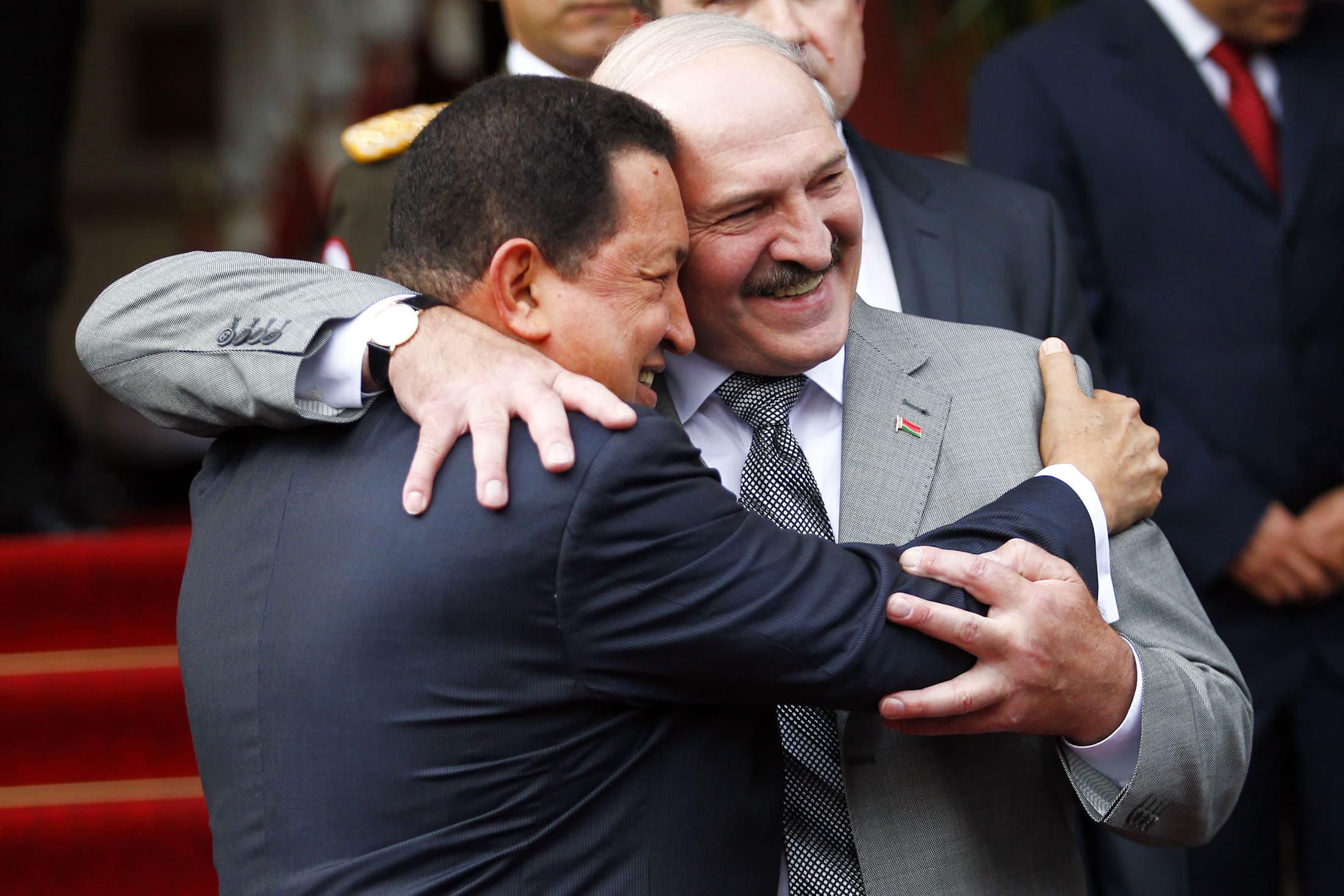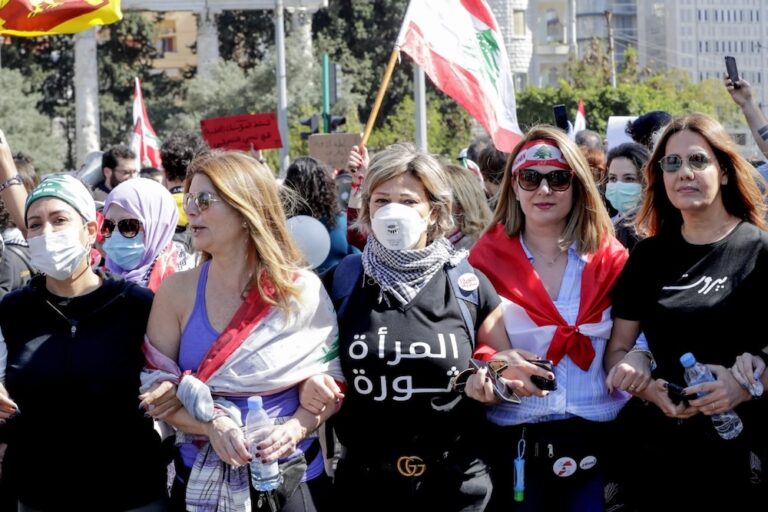Partnerships between authoritarian regimes have few ideological underpinnings other than a shared rejection of democracy and the rule of law.
Authoritarian regimes around the world are banding together to bypass international institutions and human rights norms that conflict with their abusive practices. Unlike the alliances of the Cold War era, these partnerships have few ideological underpinnings other than a shared rejection of democracy and the rule of law. But such cooperation has offered aid and solidarity to dictators under pressure, and created a marketplace through which repressive regimes can meet their technology, security, and energy needs without the headaches of transparency and accountability. And if the seven-year decline in global freedom recorded by Freedom House is any indication, authoritarianism is, sadly, a growth industry.
Technology
The 2011 Arab Spring uprisings in Tunisia, Egypt, and Libya demonstrated the power of new media in initiating political change from the bottom up. This did not go unnoticed by authoritarian leaders in other counties, who responded by pursuing advanced technical infrastructure and expertise with which to monitor and control cutting-edge outlets of dissent like social-networking sites and mobile devices. Dictators seeking sophisticated tools of repression need look no further than China, the authoritarian telecommunications hardware store.
Chinese investment in telecommunications abroad is well known. Particular attention has been paid to Beijing’s growing presence in Africa, where as of 2010, the two largest Chinese telecommunications companies, Huawei Technologies Co. and ZTE Corp., were active in over 50 countries. The two giants have played a significant role in the continent’s cellular revolution by driving down prices and providing services to over 300 million African users. Huawei and ZTE have made similar investments in Central Asia and the Middle East.
However, China’s improvements to a country’s telecommunications infrastructure are often accompanied by more advanced censorship and surveillance capabilities for the local government. In February 2013, reports emerged that China is assisting Zambia with the installation of deep-packet inspection (DPI) technology that enables the government to monitor and potentially block social media and “unfriendly” websites. Similarly, in 2010, Ethiopia purchased 150 Chinese surveillance cameras as well as satellite jamming equipment that was used, with Chinese technical assistance, to successfully block foreign satellite transmissions, including the Amharic service of Voice of America.
Both ZTE and Huawei have been accused of violating sanctions by selling sophisticated networking equipment to Iran, allowing the regime to monitor landline, mobile, and internet communications and track individuals based on the location of their cell phones. In addition, media freedom advocacy groups suspect that ZTE and Huawei were contracted by Pakistan to build an internet and mobile firewall—ostensibly to block pornography and anti-Islamic content, but potentially to censor a broad range of information. The two companies deny the allegations.
Energy
Recent oil talks between Iran and North Korea marked a new step in their loose “one trench” alliance, a reference to the perception that they have been forced together by shared international enemies. This odd couple may represent a case of extreme necessity driven by the heavy international sanctions faced by both regimes, but energy cooperation between friendly authoritarians is commonplace. A case in point is Venezuela.
The linchpin of Venezuela’s oil partnerships is late president Hugo Chávez’s Petrocaribe program, launched in 2005. Through heavily subsidized oil shipments and preferential trade agreements, the program boosted the economies of many of Venezuela’s Latin American and Caribbean neighbors. Most notably, it has propped up Cuba’s one-party regime with approximately $3.5 billion in oil subsidies that account for nearly two-thirds of the island’s total consumption. Venezuela has also made investments in the energy infrastructure of nearby allies, such as Ecuador and Bolivia. Needless to say, all of this has come at great cost to the Venezuelan public.
While the geographic, cultural, and in some cases ideological affinities between the Venezuelan government and its beneficiaries make programs like Petrocaribe a natural fit, the same cannot be said of Venezuela’s other global partnerships, with countries like Belarus and Iran. The Belarusian regime turned to new friends in Caracas in a bid to avoid overdependence on Moscow. Petrolera BeloVenezolana, a joint venture between the distant allies, was established in 2007, and hundreds of bilateral cooperation agreements now exist between the countries.
Iran is often considered Venezuela’s principal ally outside Latin America. Despite being one of the world’s largest crude exporters, Iran imports Venezuelan gasoline because it lacks sufficient domestic refining capacity. When the Venezuelan state oil company continued to trade with Iran in breach of U.S. sanctions, Washington slapped the firm with its own set of sanctions, though they were largely symbolic in nature. Ties between the countries remain strong, with over 200 bilateral agreements stressing military cooperation, intelligence sharing, and financial connections. They even teamed up on the controversial issue of nuclear energy in 2009, when Venezuela employed Iranian assistance in detecting and testing for domestic uranium deposits. More recently, Venezuela came to the aid of Iran’s Syrian client, President Bashar al-Assad, by shipping fuel to his government as it attempted to suppress an ongoing rebellion.
Community
They may face criticism in some international forums, but dictators need not feel alone. Alternative multilateral bodies, such as the Shanghai Cooperation Organization (SCO), provide authoritarian states with opportunities for diplomacy and trade, without the nuisances of democracy and human rights. Initially launched in 1996 to settle post-Soviet border disputes between Russia, China, and several Central Asian republics, the SCO evolved into an ill-defined security and economic partnership that serves as counterweight to U.S. and European influence in Asia. Of the six permanent SCO members, all but Kyrgyzstan are rated Not Free by Freedom House. In addition, the SCO’s core principle of mutual recognition of what a given member state defines as terrorism, extremism, and separatism has led to collaborative criminalization of dissident organizations and literature. In essence, the “enemies” of one member are the enemies of all. This synchronization of adversaries inevitably leads to human rights violations, particularly regarding cases of political asylum.
Despite such concerns, the SCO has gained traction in the international community. It has observer status at the United Nations and official relations with the European Union, the Association of Southeast Asian Nations (ASEAN), and other regional entities. Moreover, interest in joining the organization is increasing. India, Pakistan, and Iran are all vying to ascend from observer to member status. The addition of Belarus as a “dialogue partner” indicates aspirations beyond Asia. Turkey has even offered to drop its bid to join the European Union in exchange for full SCO membership, citing “common values.”
Indeed, the growing recognition of common interests among authoritarian and incompletely democratic governments has led to informal emulation of repressive domestic laws and practices. This is most apparent in the recent crackdown on civil society organizations in countries around the world. The wave of new laws tend to combine constraints on foreign funding, increased government oversight of groups’ financing and activities, more onerous bureaucratic and tax measures, and increased state authority to dissolve organizations. Such laws have recently been enacted in Venezuela, Ecuador, Honduras, Iran, Bahrain, Cambodia, Ethiopia, Uganda, Sierra Leone, and Tajikistan, and proposed in a number of others. Egypt continues to move forward with a new, even more restrictive law on nongovernmental organizations, having just sentenced 43 activists—including several Freedom House employees—to prison this week under the existing law.
The examples above represent only a small sample of contemporary authoritarian cooperation. As demonstrated by Russia’s continued provision of weapons to the Assad regime in Syria, including antiaircraft missiles, military partnerships and trade help to prop up oppressive leaders. Diplomatic support, such as China’s red-carpet treatment of Sudanese leader Omar al-Bashir, undermines international institutions and allows human rights violators to duck punishment. Regional agreements like the Minsk Convention are used to dilute international human rights norms.
To date, democratic countries and institutions have approached the problem in a piecemeal fashion, barring particular companies, implementing targeted sanctions, or simply stating emphatic disagreement with certain actions. But such disciplinary tactics alone do not offer a long-term solution. Meanwhile, the authoritarian warehouse only appears to be growing. To counter this alarming trend, the focus should not be on supply, but on demand. Put simply, the free world must promote democratic change in repressive states. Unless these governments are held accountable by their own people, they will always find ways to live outside international law.
Andrew Rizzardi is a political analyst with a focus on human rights, governance, and corruption. He is currently a researcher at Freedom House.



